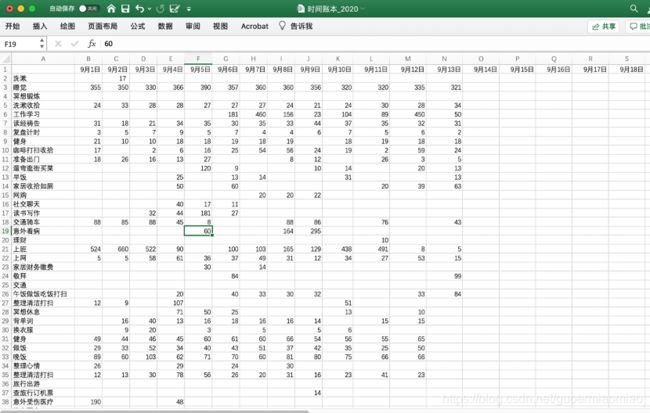Inspired by the Coursera course, Learning How to Learn, by Dr. Barbara Oakley and Dr. Terrence Sejnowski
Our brain has different working modes: Focused and Diffuse [1]. A good learner doesn’t need be hard working all the time but shall regularly have pauses. Our brain still continues working and processing even when we are not really “studying”: having a nice warm shower, doing regular physical exercises, evening during daydreaming. We shall not deprive sleeping time, neither work up too late, since good rest is as an important factor while learning. [2]
I now have a more reasonable and scientific view of Procrastination. Human brain is smart enough to move our focus to comfort us, but also fool to create the illusions of things have been done. [3] Concentrate on the process not product by divide a whole big project into smaller sections, like what I have used for this project; take first the hardest task; give self some nice reward after completing each section are all powerful ways. It is a human self-created mechanism and it could be a long term to deal with Procrastination. I am not afraid, ignoring, or beaten down by it. We might not eliminate totally; a better way is to live together with this problem. [4]
It also requires courage, honesty and self-awareness when we want to learn any new knowledge or new skills. Repeat the same level tests won’t lead to real learning but only fooling us around. Go deeper, take harder quizzes is better way to find out what exactly lack and missing and what need to be improved. [5] That’s where we shall spend our valuable time and energy. On the other hand, we shall also be patient. Repeat in different and several intervals from days to months will change knowledge and skills from temporary into long-term memory, which would solid what we learnt. Relate and connect new things into our already familiar knowledge is effective and fun way.
Thanks for that course, I am building up my own system and could really see changes, which also improve my daily life.
Here I would like to share some of my methods, tips and tools of learning.
Diversity:
Take two different types course or skill parallelly, the more far away area they are from the better. Learning cross area skills would use assorted ability: reading, imagining, handcrafting, observing, expressing, which activate brain to switch between different mode. But don't take more than 3, greediness lead to anxious and will distract us from learning.
“Tasty frog”
When I already have a clear learning goal, for example prepare for certification exam. I know clearly learning is meaningful and higher priority for me, if I didn’t learn as scheduled I will become frustrate which would effect on results and performances. Unfortunately it is very "normal" we are always interrupted by unexpected plus urgent things. If we put the hardest thing at the end of a day, we are more likely end the day before doing it.
"Eat frogs first" is one of the "10 Rules of Studying" introduced in the course, so I always put my learning as the first thing to do everyday. [5] This works very well for me and I even found this frog is "tasty". Since complete as planed, conquer my weakness is already a sweet reward for me, is the propulsion as beginning of a day.
Time Journal
I use an excel sheet to keep track on how much time I spent on everything I am doing everyday. We all have 1440 minutes for each one on each day, a good learner shall know how to allocate them.
It is a really powerful tool. I was very shocked to see how much time I really spent on charting and nutritious-less gossip internet surfing.
Music Box Pomodoro
I use a smart phone app to setup concentrate time with meditation background music, at very low volume and without lyrics. It is a similar way as traditional Pomodoro. Better thing for me is, if I couldn’t help myself and want to grab the phone, it reminds me that I am in the middle of “concentration” and shall not look at telephone. [4]
Grow with Growth mindset
I like exam, I love testing, but if by a deep self-awareness, I know it is because good results only just to satisfy my vanity, makes me feel good of myself. I probably will re-do a test more times until I get a perfect grade, even I already learnt 80%. Chasing for perfect costs me too much time and energy which I could have taken some more difficult and higher-scale exercises instead. Repeating the same exam until 100% traps me stay at the stagnate level. By the Growth Mindset theory, I now always remind myself: learning is not for performance or to be smart, but rather to grow and be better. [6]
Physical Exercise
Exercise is not to lose weight, but put whole body and organs under pressure, accelerate blood flow and circulation. This also provides sufficient fresh oxygen to your neurocells.
Say no to alcohol
Alcohol will not only damage your digestive system, but also neuro system. You probably have heard "Smart Medicine" made by LSD. It might give you beautiful grades in a very short term, even make you feel like "learning superman". But I have to warn you, nothing is gratis, one day you would really pay much more than you could afford.
Learning by Sharing
I now start to write articles and publish on CSDN: https://blog.csdn.net/guoermiaomiao
By writing down and sharing tips I summarize from my daily working software products, I found out I could better understand and remember them.
Now when I continue learning, I have very clear focuses: I want to be a life-long learner, but it doesn’t mean to take everything at once. I focus on the major related to my daily job, explore knowledges and skills, extend learning opportunity at work, be profession is the first priority.
Implementation example:
Below is a practice case of how I use these learning methods and tool to study a new programming language: JAVA.
Setup goals, setup object attitude: Programming language is difficult but don’t be afraid since everybody can learn.
Find a course: there are a lot on-line and live course, but a good course should be with updated content, multi-media teaching methods, stages exercises and final exams.
Schedule the learning interval and working load. The on-line course is already well organized and divide into modules, I choose twice a week, 30 minutes for each time.
Programing is in general a skill, meaning it requires a lot of practice. The same as we won’t learn how to swim by reading textbook. I write a lot of codes, detect errors, from simple to complex.
It also requires remembering a lot syntax. So I give time to transfer these to long-term memory.
Connect to knowledge I already have, like XML, C++. This helps me to understand the logic and the architecture of JAVA.
References
[1] Focused and Diffuse Modes. From Coursera course, Learning How to Learn, by Dr. Barbara Oakley and Dr. Terrence Sejnowski
[2] The Importance of Sleep in Learning. From Coursera course, Learning How to Learn, by Dr. Barbara Oakley and Dr. Terrence Sejnowski
[3] A Procrastination Preview. From Coursera course, Learning How to Learn, by Dr. Barbara Oakley and Dr. Terrence Sejnowski
[4] Week 3 of Procrastination. From Coursera course, Learning How to Learn, by Dr. Barbara Oakley and Dr. Terrence Sejnowski
[5] 10 Rules of Good Studying. From Coursera course, Learning How to Learn, by Dr. Barbara Oakley and Dr. Terrence Sejnowski
[6] Dweck, C. (2006). Mindset: The New Psychology of Success NY: Random House.


